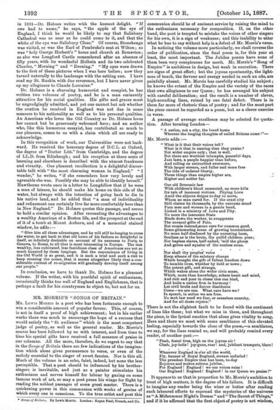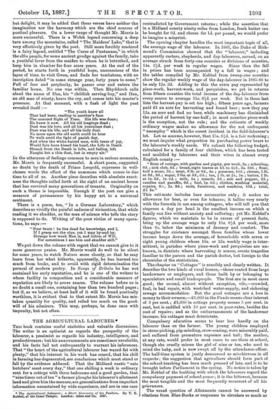MR. MORRIS'S "SONGS OF BRITAIN."
MR. LEWIS MORRIS is a poet who has been fortunate enough to win a considerable amount of popular favour. This, of course, is not in itself a proof of high achievement ; but in his earlier works there was much to encourage the hope of a success that would satisfy the "fit audience" which is the most competent judge of poetry, as well as the general reader. Mr. Morris's course has been followed by us with interest, and from time to time his special gifts have received a fall measure of praise in our columns. All the more, therefore, do we regret to say that in the Songs of Britain there are few indications of the imagina- tion which alone gives permanence to verse, or even of the melody essential to the singer of sweet fancies. Nor is this all. Much of the volume is an echo, faint, indeed, but none the less perceptible. That a poet should be influenced by his brother- singers is inevitable, and just as a painter stimulates his enthusiasm and nerves himself for labour by gazing on some famous work of art, so may a poet preen his wings for flight by reading the noblest passages of some great master. There is a quickening power in this communion with works of genius of which every one is conscious. To the true artist and poet this Bongs of Britain. By Lewis Kerrie. London: Kogan Paul, Trends, and Co.
communion should be of eminent service by raising the mind to the enthusiasm necessary for composition. If, on the other hand, the poet is tempted to mistake the voices of other singers for his own, it is a sign of weakness; and this inability to utter what he has to say without help is a defect of Mr. Morris's verse.
In noticing the volume more particularly, we shall reverse the order of publication, since the final poem is, for this year at least, the most important. The Jubilee poems have none of them been very conspicuous for merit. Mr. Morris's "Song of Empire" is ambitions in design, but weak in execution. There are signs of great effort; but the joyous spontaneity, the light. uess of touch, the fervour and energy needed in such an ode, are painfully absent. Mr. Morris has carefully studied his subject ; he knows the extent of the Empire and the variety of the races that own allegiance to our Queen ; he has arranged his subject with careful deliberation; and the result is a number of clever, high-sounding lines, ruined by one fatal defect. There is in them far more of rhetoric than of poetry ; and for the most part the piece cannot be regarded as a poem, but as a clever exercise in verse.
A passage of average excellence may be selected for quota- tion. After terming London- " A nation, not a oily, the loved home
Whereto the longing thoughts of exiled Britons come
Mr. Morris adds :— "What is it that their voices tell ?
What is it that in naming thee they praise?
Not wider empire only that is well.
But there are worthier triumphs, peaceful days,
Jost laws, a people happier than before,
And rolling on untroubled evermore, With larger stream, and fuller and more free The tide of ordered liberty.
These things than empire higher are, Higher and nobler far.
Our old Draconio law With children's blood cemented, no more kills Its tale of innocent victims. Pitying Love Amid the objects deigns to-day to move, Whom no man cared for. If the cruel city Still claims its thousands, by the outcasts stand Pare men and women in a gentle band, Linked in a ministry of Love and Pity. No more the insensate State Binds down the worker, to exaggerate The unequal gifts of Fats,
But comes insteadoome care for common good, Some glimmering sense of growing brotherhood. No more half-deafened by the norm:ging loom, &Innen as is the brute, the pallid children pine; Nor hapless slaves, half-naked, 'mid the gloom And grime and squalor of the sunless mine.
• • • • ..... • .
Nor shall thy peoples' voice Keep silence of the salutary change Which brought the gift of fullest freedom down To humble lives, whether by field or town ; The potent gift, and strange, Which wakes alone the wider civic sense, Which, more than knowledge, sobers heart and mind, And rich and poor in closer ties can bind, And knits a nation firm in harmony ! Let civil broils and fiercer dissidence Come—we are one. What care have we ?
In speech, in action we are free.
No mob law need we fear, or senseless anarchy,
And for alt these rejoice."
There is not the slightest fault to be found with the sentiment of lines like these; but what we miss in them, and throughout the piece, is the lyrical emotion that alone gives vitality to song. Here and there we meet with some semblance of this elevated feeling, especially towards the close of the poem,—a semblance, we say, for the lines remind us, and will probably remind every reader, of another poet :—
"Flash, festal fires, high on the joyous sir!
Clash, joy-bells ! joy-guns, roar! and, jubilant trumpets, blare!
• • • • • • • ..... Wherever England is o'er all the world, Fly, banner of Royal England, stream oaf arled !
The proudest Empire that bas been, to-day Rejoices and makes solemn jubilee.
For England ! England ! we our voices raise !
Our England! England! England ! in our Queen we praise!"
It appears to us that in proportion to Mr. Morris's ambition to treat of high matters, is the degree of his failure. It is difficult to imagine any reader being the wiser or better after reading such laboured efforts to expound the mysteries of the universe as "A Midsummer Night's Dream" and" The Secret of Things," and if it be affirmed that the first object of poetry is not wisdom,
but delight, it may be added that these verses have neither the imagination nor the harmony which are the chief sources of poetical pleasure. On a lower range of thought Mr. Morris is more sacceesfal. There is a Welsh legend concerning a deep tarn among the mountains, called "The Maidens' Lake," that is very effectively given by the poet. Still more forcibly rendered is a fairy legend, entitled "The Curse of Pantannam," in which the elfin people, for some ancient grudge against the family, take a youthful lover from the maiden to whom he is betrothed, and keep him in slumber for four score years. At the end of the period, he starts forth in youthful hope, unconscious of the lapse of time, to visit Gwen, and finds her tombstone, with an inscription dated "in some strange year, forty years to come." Full of fear and perplexity, he passes over and enters the familiar home. No one was within. Then Rhydderch calls aloud the name of Han, his" childish serving-boy," and Han, an old man of ninety, hears the cry, and comes into his master's presence. At that moment, with a flash of light the past revealed itself :-
" The youth knew all That had been, reading in another's face The unnoted flight of Time. His life was done; He knew it sow. All his old longings dead ; Dust was his love, and all his yearnings dust ; Dust was his life, and all his body duet. No more upon the old earth could he bear To walk amid the light of garish day, And when the white-haired man, with tears of joy, Would fain have kissed his hand, the Life in Death Shrank from the Death in Life, and fading, left Naught but a thin dust, lost in empty air.'
In the utterance of feelings common to men in serious moments, Mr. Morris is frequently successful. A short poem, suggested no doubt by the death of Prince Leopold, expresses in well- chosen words the effect of the summons which comes in due time to all of us. Another piece describes with absolute exact- ness the thoughts called forth at the sight of an ancient house that has survived many generations of tenants. Originality on such a theme is impossible. Enough if the poet can give a measure of permanence by his happy art to a universal sentiment.
There is a poem, too, "In a German Laboratory," which describes so vividly the painful sadness of vivisection, that while reading it we shudder, as the man of science who tells the story is supposed to do. Writing of the poor victim of many opera- tions, he says :-
"Poor brats! he lies dead for knowledge, and I, if I grasp not the clue, yet I may by-and-by. Strange how weak Man is, and infirm of Will, For sometimes I see him and shudder still."
We put down the volume with regret that we cannot give to it more generous praise. Mr. Morris would do well to be silent for some years, to watch Nature more closely, so that he may learn from her what hitherto, apparently, he has learned too much from books, and to avoid with rigid determination the perusal of modern poetry. In Songs of Britain he has not sustained his early reputation, and he is one of the writers to whom facility in composition and a considerable measure of reputation are likely to prove snares. The volume before us is no doubt a small one, containing less than two hundred pages ; but if, as we believe, at least half of it will be found poetically worthless, it is evident that to that extent Mr. Morrie has mis- taken quantity for quality, and relied too much on the good- will of his admirers. This may, perhaps, be done once with impunity, but not often.



































 Previous page
Previous page